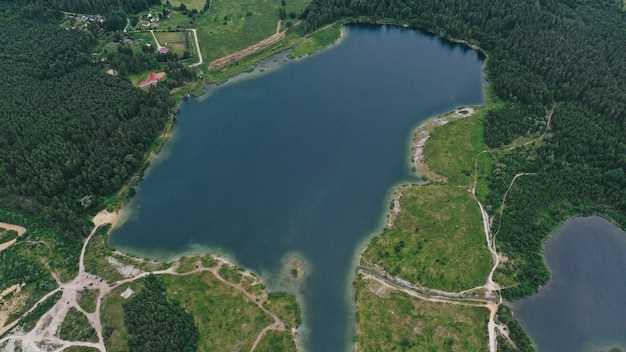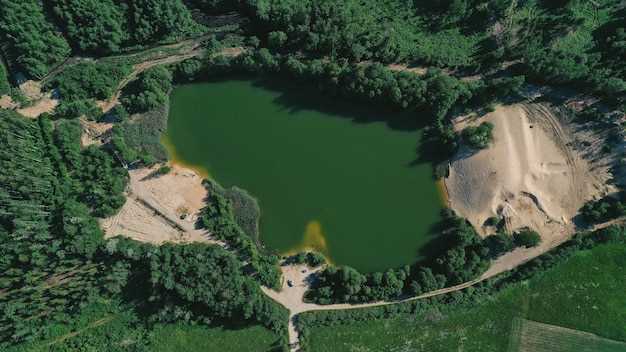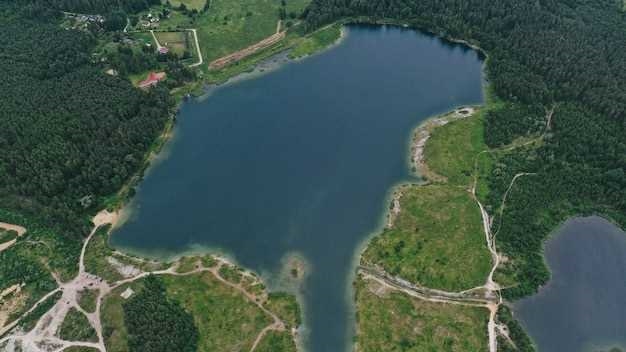
Ensuring the availability of safe drinking water and adequate sanitation facilities in remote areas has emerged as a pressing global challenge. The scarcity of clean water sources and the lack of proper sanitation infrastructure pose significant health risks and hinder socio-economic development in these regions. To address this issue, innovative and sustainable solutions are being implemented to improve the accessibility and quality of water and sanitation services.
Empowering Local Communities: One of the key strategies for enhancing access to clean water and sanitation in rural areas is to empower local communities. By involving community members in decision-making processes and providing them with the necessary knowledge and skills, sustainable solutions can be developed and implemented. This approach fosters a sense of ownership and responsibility among the community, leading to the long-term sustainability of water and sanitation projects.
Implementing Nature-Based Solutions: Nature-based solutions offer a promising approach to address water and sanitation challenges in remote regions. These solutions utilize natural processes and ecosystems to enhance water quality, conserve water resources, and improve sanitation practices. Examples include the construction of wetlands for wastewater treatment, the restoration of natural water sources, and the implementation of rainwater harvesting systems. These nature-based solutions not only provide sustainable water and sanitation services but also contribute to the preservation of biodiversity and ecosystem health.
The Significance of Pure Water and Hygiene in Rural Regions
In the context of enhancing accessibility to uncontaminated water and proper sanitation in remote areas, it is crucial to acknowledge the immense importance of these fundamental necessities for rural communities. The provision of safe and clean water, as well as the implementation of effective sanitation practices, play a pivotal role in promoting the overall well-being and sustainable development of rural regions.
Enhancing Health and Preventing Diseases
Access to pure water and sanitation facilities is essential for maintaining good health and preventing the spread of diseases in rural areas. Clean water is a fundamental requirement for drinking, cooking, and personal hygiene, ensuring that individuals are not exposed to harmful contaminants and pathogens. Proper sanitation practices, such as the availability of toilets and waste management systems, significantly reduce the risk of waterborne diseases and improve overall hygiene standards within communities.
Empowering Economic and Social Development

The availability of clean water and sanitation facilities in rural areas has a profound impact on the economic and social development of communities. Access to safe water sources enables agricultural activities, ensuring sufficient irrigation for crops and livestock, leading to increased productivity and food security. Additionally, improved sanitation facilities contribute to a healthier workforce, reducing absenteeism and improving productivity. Moreover, the provision of clean water and sanitation services enhances the dignity and well-being of individuals, particularly women and girls, by reducing the burden of water collection and providing a safe and private environment for personal hygiene.
In conclusion, recognizing the significance of pure water and hygiene in rural areas is crucial for understanding the need to improve access to these essential resources. By prioritizing the development of sustainable solutions, we can ensure the well-being, health, and prosperity of rural communities, ultimately contributing to their overall growth and development.
Challenges in Providing Clean Water and Sanitation in Rural Areas
Addressing the obstacles to ensuring access to safe and hygienic water and sanitation services in remote regions presents a multitude of difficulties. These hurdles arise from various factors, including geographical isolation, limited resources, inadequate infrastructure, and cultural barriers. Overcoming these challenges requires innovative approaches and collaborative efforts to create sustainable solutions.
Geographical Isolation: One of the primary challenges in delivering clean water and sanitation services to rural areas is the geographical isolation of these communities. Remote regions often lack proper road networks and transportation facilities, making it difficult to reach these areas with essential supplies and equipment. Additionally, the presence of rugged terrain and long distances further exacerbate the logistical challenges faced by service providers.
Limited Resources: Another significant challenge is the limited availability of resources in rural areas. These communities often lack the financial means and technical expertise required to develop and maintain water and sanitation infrastructure. Insufficient funding, scarcity of skilled personnel, and a lack of access to modern technologies hinder the implementation of sustainable solutions, making it challenging to provide clean water and sanitation services to the rural population.
Inadequate Infrastructure: The absence or inadequacy of infrastructure poses a significant obstacle to improving water and sanitation conditions in rural areas. Many remote communities lack proper water supply systems, sewage networks, and waste management facilities. The lack of infrastructure not only hampers the delivery of clean water but also contributes to the contamination of water sources, leading to health risks and the spread of waterborne diseases.
Cultural Barriers: Cultural beliefs and practices can also impede efforts to provide clean water and sanitation services in rural areas. Traditional customs, taboos, and gender roles may affect the acceptance and adoption of modern sanitation practices. Overcoming these cultural barriers requires community engagement, education, and awareness campaigns to promote the importance of clean water and sanitation for overall health and well-being.
In conclusion, the challenges in providing clean water and sanitation in rural areas stem from geographical isolation, limited resources, inadequate infrastructure, and cultural barriers. Addressing these challenges requires a comprehensive and collaborative approach that incorporates innovative solutions, community involvement, and sustainable practices.
Innovative Technologies for Clean Water and Sanitation
Advancements in technology have revolutionized the way we address the challenges of providing clean water and sanitation in rural areas. This section explores the innovative solutions that have emerged to tackle these pressing issues, focusing on alternative approaches and cutting-edge technologies.
Water Purification Systems
One of the key areas of innovation in clean water technology is the development of advanced water purification systems. These systems utilize state-of-the-art filtration techniques and chemical treatments to remove contaminants and ensure the provision of safe drinking water. From membrane filtration to ultraviolet disinfection, these technologies offer efficient and sustainable solutions for rural communities.
Sanitation Solutions
Improving sanitation practices is crucial for promoting public health and preventing the spread of diseases in rural areas. Innovative sanitation solutions aim to address the challenges of limited access to proper sanitation facilities. This includes the development of eco-friendly toilets that use minimal water or even recycle waste for energy production. Additionally, smart waste management systems are being implemented to optimize waste disposal and minimize environmental impact.
| Technology | Benefits |
|---|---|
| Biogas Digesters | Converts organic waste into biogas for cooking and heating purposes, reducing reliance on traditional fuels and improving air quality. |
| Water ATMs | Provides access to clean water through automated kiosks, ensuring affordability and convenience for rural communities. |
| Solar-powered Water Pumps | Utilizes renewable energy to pump water from underground sources, reducing the need for manual labor and improving efficiency. |
These innovative technologies offer sustainable and scalable solutions to improve access to clean water and sanitation in rural areas. By harnessing the power of technology, we can overcome the challenges and create a healthier and more sustainable future for all.
Community Engagement and Empowerment for Sustainable Solutions
Involving and empowering local communities is crucial for the long-term success of sustainable solutions aimed at enhancing access to safe and hygienic water and sanitation services in rural regions. This section explores the significance of community engagement and empowerment in addressing the challenges related to water and sanitation in these areas.
Fostering Active Participation
Active participation of community members is essential in developing and implementing sustainable solutions. By actively involving individuals and groups, we can tap into their knowledge, experiences, and perspectives, ensuring that the solutions are tailored to the specific needs and circumstances of the community. This approach fosters a sense of ownership and responsibility, leading to increased commitment and sustainability of the implemented initiatives.
Building Capacity and Empowering Communities
Empowering communities through capacity building initiatives plays a vital role in achieving sustainable solutions. By providing training and education on water and sanitation management, hygiene practices, and infrastructure maintenance, communities can develop the necessary skills and knowledge to take charge of their own water and sanitation systems. This empowerment not only enhances the community’s ability to address immediate challenges but also equips them to adapt and respond to future changes effectively.
By actively engaging and empowering communities, we can foster a sense of ownership, responsibility, and resilience, leading to sustainable solutions that address the water and sanitation needs of rural areas. Through collaboration and capacity building, communities can become active participants in the decision-making processes, ensuring the long-term success and sustainability of the implemented initiatives.
Government Policies and Funding for Rural Water and Sanitation Projects
In this section, we will explore the role of government policies and funding in addressing the challenges related to water and sanitation in rural areas. We will examine the various strategies and initiatives implemented by governments to ensure the availability of clean water and proper sanitation facilities for rural communities.
Government policies play a crucial role in shaping the direction and priorities of rural water and sanitation projects. These policies aim to address the specific needs and challenges faced by rural areas, taking into account factors such as geographical location, population density, and economic conditions. By implementing targeted policies, governments can create a conducive environment for sustainable solutions to improve water and sanitation access in rural communities.
Funding is another critical aspect of rural water and sanitation projects. Governments allocate financial resources to support the implementation of these projects, ensuring that adequate funds are available for infrastructure development, capacity building, and maintenance. Additionally, governments may also seek external funding from international organizations and donors to supplement their own resources.
Government funding for rural water and sanitation projects is often channeled through dedicated programs and initiatives. These programs aim to provide financial assistance to rural communities, enabling them to access clean water sources and sanitation facilities. By prioritizing funding for these projects, governments demonstrate their commitment to improving the living conditions and overall well-being of rural populations.
Furthermore, government policies and funding mechanisms also focus on promoting community participation and ownership in water and sanitation projects. This approach ensures that local communities are actively involved in decision-making processes, implementation, and maintenance of these projects. By empowering rural communities, governments can foster a sense of ownership and responsibility, leading to the long-term sustainability of water and sanitation initiatives.
In conclusion, government policies and funding play a crucial role in addressing the challenges of water and sanitation in rural areas. Through targeted policies, adequate funding, and community participation, governments can ensure the availability of clean water sources and proper sanitation facilities in rural communities, ultimately improving the quality of life and promoting sustainable development.
Success Stories: Examples of Effective Projects Ensuring Clean Water and Sanitation in Rural Regions
Within the realm of enhancing accessibility to safe drinking water and proper sanitation facilities in remote areas, numerous remarkable initiatives have emerged, showcasing the triumph of sustainable approaches. These projects have successfully addressed the pressing challenges faced by rural communities, fostering positive change and improving the overall quality of life.
1. Empowering Communities through Rainwater Harvesting:
- A community-led project in a rural village implemented an innovative rainwater harvesting system, enabling the collection and storage of rainwater for domestic use.
- By constructing simple yet effective rainwater catchment systems, the project provided a reliable and sustainable water source, reducing the community’s dependence on distant water sources.
- Through active community participation and training, the project not only ensured access to clean water but also promoted water conservation practices.
2. Promoting Hygiene Education and Sanitation Facilities:
- In a remote region, a non-profit organization initiated a comprehensive program focusing on hygiene education and the establishment of sanitation facilities.
- By conducting interactive workshops and awareness campaigns, the project successfully educated community members about the importance of proper hygiene practices.
- Additionally, the organization collaborated with local authorities to construct community toilets and handwashing stations, significantly reducing the prevalence of waterborne diseases.
3. Harnessing Solar Energy for Water Purification:
- A sustainable project in a rural area introduced solar-powered water purification systems, ensuring access to safe drinking water without relying on conventional energy sources.
- By utilizing solar energy, the project not only provided clean water but also contributed to reducing carbon emissions and promoting environmental sustainability.
- The initiative involved training local technicians to maintain and operate the solar-powered systems, fostering self-sufficiency and long-term project sustainability.
4. Collaborative Efforts for Water Infrastructure Development:
- A collaborative effort between government agencies, NGOs, and local communities successfully implemented a large-scale water infrastructure development project in a rural region.
- The project involved the construction of water supply networks, installation of water treatment facilities, and establishment of community-based water management committees.
- By involving the community in decision-making processes and ensuring their active participation, the project achieved sustainable management of water resources and improved water quality.
These success stories exemplify the effectiveness of diverse approaches in addressing the challenges of water and sanitation in rural areas. By implementing innovative solutions, fostering community engagement, and promoting sustainable practices, these projects have made significant strides towards ensuring a healthier and more prosperous future for rural communities.



